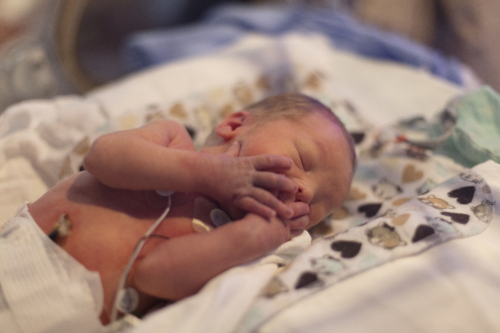A letter from Nori Sinclair, Benjamin’s mom
A complicated pregnancy is not the experience an expectant mother dreams about. Despite a relatively straightforward pregnancy with my first son, Theodore, I was told that that my second pregnancy might be a difficult one.
Diagnosed with the chronic illness Crohn’s Disease at 13 years old, I am no stranger to hospitals. I have had six major surgeries and still experience complications, two decades later. With my medical history, a diagnosis of gestational diabetes and Theodore’s early arrival at 35 weeks, my second pregnancy was designated as high-risk and needed to be closely monitored. Scans also revealed that I had placenta previa, a condition that causes the placenta to block the mother’s cervix, which can lead to severe bleeding during pregnancy and even preterm birth.
I remember the morning of April 9, 2019 clearly. At 29 weeks pregnant, I woke up and found that I was bleeding. This can be a serious complication of placenta previa, so my husband Nathan drove me to Victoria General Hospital (VGH) for assessment. I was admitted to their Antepartum Unit for monitoring and the medical team prepared for the possibility of my baby being born that day. I was given steroid shots to help ready my baby’s lungs for an early arrival and was put on a fetal monitor to watch for signs that my baby might be in distress. Luckily, that bleed stopped, but it started again two days later. It was decided that I needed to stay in the hospital for the rest of my pregnancy.
Being stuck in hospital when you have a three-year-old at home is not ideal, but knowing that my baby and I were in the hands of expert doctors and nurses reassured me. I felt like a ticking time bomb: waiting for the next bleed to start, waiting for the latest bleed to stop, always hoping for our child to stay in and grow as much as possible. Every day, every hour counted for his development. After two nerve-wracking weeks in the hospital, I had a sudden and severe amount of bleeding. My care team made the decision to do an emergency C-section for my safety and that of my unborn baby. I was rushed to the OR, scared, but ready to meet my second little miracle.
On April 24, at just over 31 weeks gestation, baby Benjamin was born. He weighed only four pounds and three ounces. He was tiny, fragile and his respiratory system was underdeveloped. Benjamin was given surfactant to open up his lungs and was put on a ventilator. He was quickly transferred to the Red Room, the highest level of the hospital’s Neonatal Intensive Care Unit (NICU). Benjamin needed constant monitoring and care from a team of specialists in order to be well enough to breathe on his own.
It broke my heart to see our son in an incubator, connected to so many wires, tubes and machines. There was very little we could do as parents to make things better for him — we were totally reliant on the nurses and doctors, with their expertise and sophisticated equipment, to make Benjamin well. After a few days Benjamin was able to breathe on his own and was moved to the NICU’s second tier, the Blue Room, for further care. After two weeks, he was strong enough to transfer to the NICU’s Green Room, the least acute level of care, where he was monitored while he fed and grew.
The care that Benjamin and I received was exceptional. It was incredible to see the nurses rally around the babies in the NICU – it felt like there was a whole community of people protecting and caring for them. It was hard at times to be told that Benjamin was not ready to be held or that he needed to go back in the incubator, but I knew that the caregivers were acting in his best interest. When I wasn’t able to hold Benjamin, it was comforting to watch his steady breathing and strong heartbeat on his patient monitor, tangible evidence that he was doing well and progressing.
I am so grateful to have this advanced level of care available in Victoria. With my older son Theodore at home, I can’t even imagine what travelling to another city would be like during this difficult time. It was reassuring to know that Benjamin was in the best possible hands, growing stronger and receiving the care he needed to thrive. After a month in the NICU, Benjamin was able to come home. He is still small, but has learned how to feed on his own and is growing steadily. At his last check-in, he weighed six pounds, three ounces and he’s even getting little chubby cheeks. Without the nurturing, healing environment of the NICU, and the donors that support the NICU, this never would have been possible.
This spring, the Victoria Hospitals Foundation is asking the community to help support the purchase of 40 new patient monitors for the NICU and PICU at VGH. You can help children like Benjamin, who need life-saving care to get well and go home to their families. I can tell you firsthand what a difference your support makes. Thank you from the bottom of my heart for considering supporting this vital campaign.
With gratitude,
Nori Sinclair





